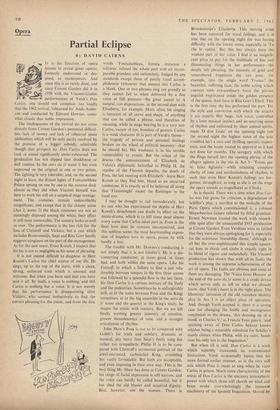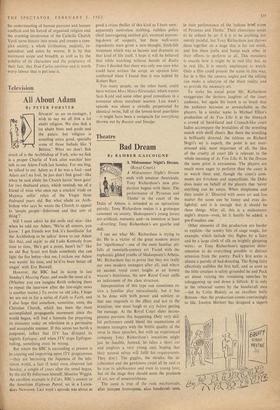Opera
Partial Eclipse
By DAVID CAIRNS
The inadequacies of the revival do not come directly from Covent Garden's perennial difficul- ties, lack of money and lack of rehearsal space (difficulties which will be only partly resolved by the promise of a bigger subsidy, admirable though that prospect is). Don Carlos does not look or sound significantly under-rehearsed. The production has not slipped into shoddiness or dull routine. In the auto do le scene it has even improved on the original at one or two points. The lighting is very tolerable; and, on the second night at least, the distant lights of Fontainebleau Palace sprang on one by one in the autumn dusk almost as they did when Visconti himself was here to work his will on a sceptical stage manage- ment. The costumes remain indescribably magnificent, and except that in the cloister scene (Act 2, scene 2) the black costumes are not so cunningly disposed among the white, their effect is still most memorable. The scenery looks as,well as ever. The performance is the less rich foi the loss of Christoff and Vickers; but a cast which includes Brouwenstijn, Siepi and Rita Gorr hardly suggests stinginess on the part of the management. As for the new tenor, Ernst Kozub, I suspect that his fee is not as negligible as his sense of phrasing.
It is not indeed difficult to diagnose in Herr Kozub's Carlos the chief source of our ills. He sings, up to the top of the stave, with a clean, strong, unforced tone which is unusual and welcome. But when you have said that you have said it all. By itself, a voice is nothing, and thit Carlos is nothing but a voice. It is not merely that his performance is disappointing after Vickers, who seehied instinctively to find the correct phrasing for the music, and from the first
words 'Fontainebleau, foresta immensa e solitaria' infused the whole part with an incom- parable grandeur and melancholy. Judged by any standards except those of purely vocal accom- plishment (whatever that means) this Carlos is a blank. One or two phrases ring out grandly as they cannot fail to when delivered by a fine voice at full pressure—the great ascent to A natural, con disperazione, in the second duet with Elisabetta, for example.,More often his singing is innocent of all curve and shape, of anything that can be called a phrase, and therefore of meaning, while in stage bearing he is a very not- Carlos, vacant of eye, boneless of gesture. Carlos is a weak character (it is part of Verdi's theme— the tragedy of private and personal feelings broken on the wheel of political necessity—that he should be). His weakness is in his terrible vulnerability to events. But the crises of the drama—the announcement of Elizabeth de Valois's diplomatic betrothal to Philip 11, the repulse of the Flemish deputies, the death of Posa, the last meeting with Elizabeth—leave Herr Kozub as they find him, bland as an uncarved tombstone. It is exactly as if he believed all along that 'Fiamminghi' meant the ,flamingos in the local zoo.
I may be thought to rail immoderately, but no one who has experienced the depths of Herr Kozub's detachment can doubt its effect on the music-drama, which is to kill stone dead almost every scene that Carlos takes part in. Even in the final love duet he remains uncommitted, and this sublime scene, the most heartrending expres- sion of hopeless love in opera, passes, by with hardly a tear.
The trouble with Mr. Downes's conducting is not simply that it is not Giulini's. He is a dis- concerting conductor, at times good, at times bad, and both within the same opera. Like his Falstali, in which a failure to find a just rela- tionship between tempos in the first three scenes was followed by a splendid flow in the last three, his Don Carlos is a curious mixture of the lively and the pedestrian. Sometimes he is unforgivably dull, as in the scene between Posa and the King; sometimes, as in the big ensemble in the auto da ft' scene and the quartet in the King's study, he shapes the music with mastery. But we are left finally wanting greater intensity of emotion, greater incandescence of tone, and ,a stronger articulation of rhythm.
John Shaw's Posa is not to be compared with Gobbi's for truth and subtlety, dramatic or musical, any more than Siepi's finely sung but rather too sympathetic Philip II is to be com- pared with Christoff's tormented portrait of the jewel-encrusted, carbuncled King, crumbling but vastly formidable. But both are acceptable, and even imposing in their own way. This is the best thing Mr. Shaw has done at Covent Garden; his range of facial expression is still narrow, and the voice can hardly be called beautiful, but it has shed the old bluster and acquired dignity. Best, however, are the women. There is Brouwenstijn's Elisabetta. This moving artist has been censured for vocal failings, and it is true that on the opening night she was having difficulty with the lowest notes, especially in 'Tit the le vanita.' But this has always been the weakest part of her voice. I find it an insignifi- cant price to pay for the multitude of fine and illuminating things in her performance--the deeply felt phraSing, the intensity of grief and remembered happiness she can pour, fur example, into the single word 'France.' the beautiful, suffering face, the noble acting which conveys with extraordinary force the private anguish imprisoned inside the golden presence of the queen. And there is Rita Gorr's Eboli. This is the first time she has performed the part. Yet the style and conviction with which she attacks it are superb. Her huge, rich voice, controlled by a keen musical instinct and an unerring sense of rhythm and enlivened by sheer animal spirits. made '0 don fatale' on the opening night (on the, second night the highest notes of the aria troubled her) a rare and thrilling operatic experi- ence, and the house roared its approval as it had not done for months. The savagery with which she flingS herself into the opening phrase of the allegro agitato in the trio in Act 3-1"rema per te, falso ligluiolo'—while retaining complete clarity of tone and sueefootedness of rhythm, is such that even Herr KOzub's failings are for- gotten; throughout, as long as she is on'the stage the opera sounds as magnificent as it looks.
As is should. There was a time when Don Car- los was fair game for criticism, a degradation of Schiller's play, a sacrifice to the molochs of the Paris Opera which commissioned it, a colossal Meyerbeerian failure relieved by fitful grandeur. Ernest Newman treated the work with remark- able spite after the unsuccessful 1933 production at Covent Garden. Even Verdians were so rattled that they were always apologising for it, especially for the notorious 'friendship theme.' although to all but the over-sophisticated this simple square- cut tune in thirds and sixths is exactly right in its blend of vigour and melancholy. The Visconti production has shown that with all its faults the work is among the supreme achievements of the art of opera. The faults are obvious and some of them are damaging. The 'Voice from Heaven' at the end of the auto do fe scene is a crude device which serves only to tell us what we already know, that Verdi's heart in the right place. The librettists' intrusion of the old mistaken identity ploy in Act 3 is an abject piece of operatese. And, though Verdi acepted it, there is a strong case for changing the feeble and incongruous conclusion to the drama, 'this dressing up of a monk as Charles V,' as Francis Toye puts it, 'and spiriting away of Don Carlos heaven knows ,whither being a miserable substitute for Schiller's manly climax when Philip, with icy calm, hands over his only son to the Inquisition.'
But when all is said, Don Carlos is a work which superbly transcends its conventional limitations. Verdi occasionally lapses into his more formal earlier manner, as in the very stiff
aria which Posa is made to sing when he visits Carlos in prison. Much more characteristic of the
music of Don Carlos is the uncanny atmospheric power with which those soft chords on wind and brass evoke overwhelmingly the immense machinery of the Spanish Inquisition. Moved by his understanding of human passions and human conflicts and his hatred of organised religion and the crushing intolerance of the Catholic Church Verdi turns history into music and creates a com- plex society, a whole civilisation, majestic, re- splendent, and eaten by worms. It is by this enormous scope and breadth, as well as by the nobility of its characters and the poignancy of their fate, that Don Carlos survives and is worth every labour that is put into it.



































 Previous page
Previous page